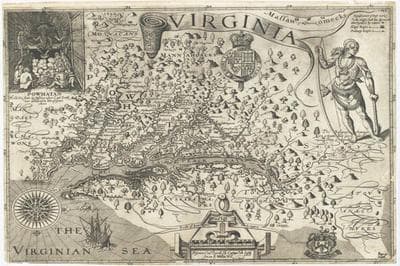Advertisement
America's Deadly Early Days
Steering toward Thanksgiving, the real story of those who sailed from Europe to America, and how tough the settlement was.

Thanksgiving’s just around the corner now. Maybe you’ve started shopping just a little for your meal. It’s the one day of the year devoted to looking back to Pilgrims and Native Americans and trans-Atlantic settlement. Historian Bernard Bailyn reminds us once again that we look back with fantastically rose-colored glasses. Bailyn looks at those early years in Plymouth and Jamestown and the New Amsterdam that would become New York and sees something like horror. Shocking suffering as one world met another. This hour, On Point: early American settlement – the “barbarous years.”
-- Tom Ashbrook
Guest
Bernard Bailyn, author of "The Barbarous Years: The Peopling of British North America — The Conflict of Civilization, 1600-1675." Winner of the Pulitzer Prize for History in 1969 and 1987. Also author of "The Ideological Origins of The American Revolution," "Voyagers To The West: A Passage in the Peopling of America on the Eve of the Revolution" and "To Begin the World Anew: The Genius and Ambiguities of the American Founders." Professor of history emeritus at Harvard University.
From Tom's Reading List
Harvard Magazine: Brutish Beginnings — "Today’s images of the seventeenth century— up the road from Williamsburg at Historic Jamestowne or down the road from Harvard at Plimouth Plantation—aren’t so well scrubbed. But neither site can begin to recreate the stench, the terror, the misery that haunted every place and everybody in that bloody era. Living-history museums dare not drive away those they hope to educate by revealing too much of the bitter truth."
The New Republic: How Ghastly Were the Beginnings of European America? — "In his new book, Bailyn tries to combine the exceptionalist framework with newer scholarship that dwells on the miseries, rather than the uplift, of the settler frontier. Again he casts the colonists as struggling, and failing, to replicate old European ways in the new land. Instead, they had to adapt to 'the new configurations of life that were emerging around them. In the process they created new vernacular cultures and social structures similar to but confusingly different from what had been known before.'"
Advertisement
The New York Times: Into the Wilderness — "The colony was a commercial enterprise, started by the Virginia Company with the sort of careful financial evaluation that in the more recent past was the hallmark of the dot-com boom. Once the colony’s backers discovered that Chesapeake Bay was, contrary to their initial belief, laden with neither gold and silver nor a passage to the Pacific, they tried everything they could think of to salvage their investment. Ship after ship of ill-equipped migrants — many of them abducted, many of them children — went out, each vessel intended to fulfill some new harebrained scheme: winemaking, silk-making, glassmaking. Each and every one failed, as did the Virginia Company, which went bankrupt in 1624."
Read An Excerpt Of "The Barbarous Years: The Peopling Of British North America" by Bernard Bailyn
Remembering Doris Lessing, 1919-2013
Nobel Prize-winning author Doris Lessing died Sunday at her home in London at age 94. She was raised in the British colony of Southern Rhodesia — now Zimbabwe—the setting of her first novel, “The Grass is Singing”. In 2007, she won the Nobel Prize in Literature for her life’s work. Her loosely autobiographical 1962 novel “The Golden Notebook” is widely considered by critics to be her best work. In 2008, she spoke with On Point about her final book, “Alfred and Emily” — part fiction, part memoir — based on the lives of her parents.
This program aired on November 18, 2013.